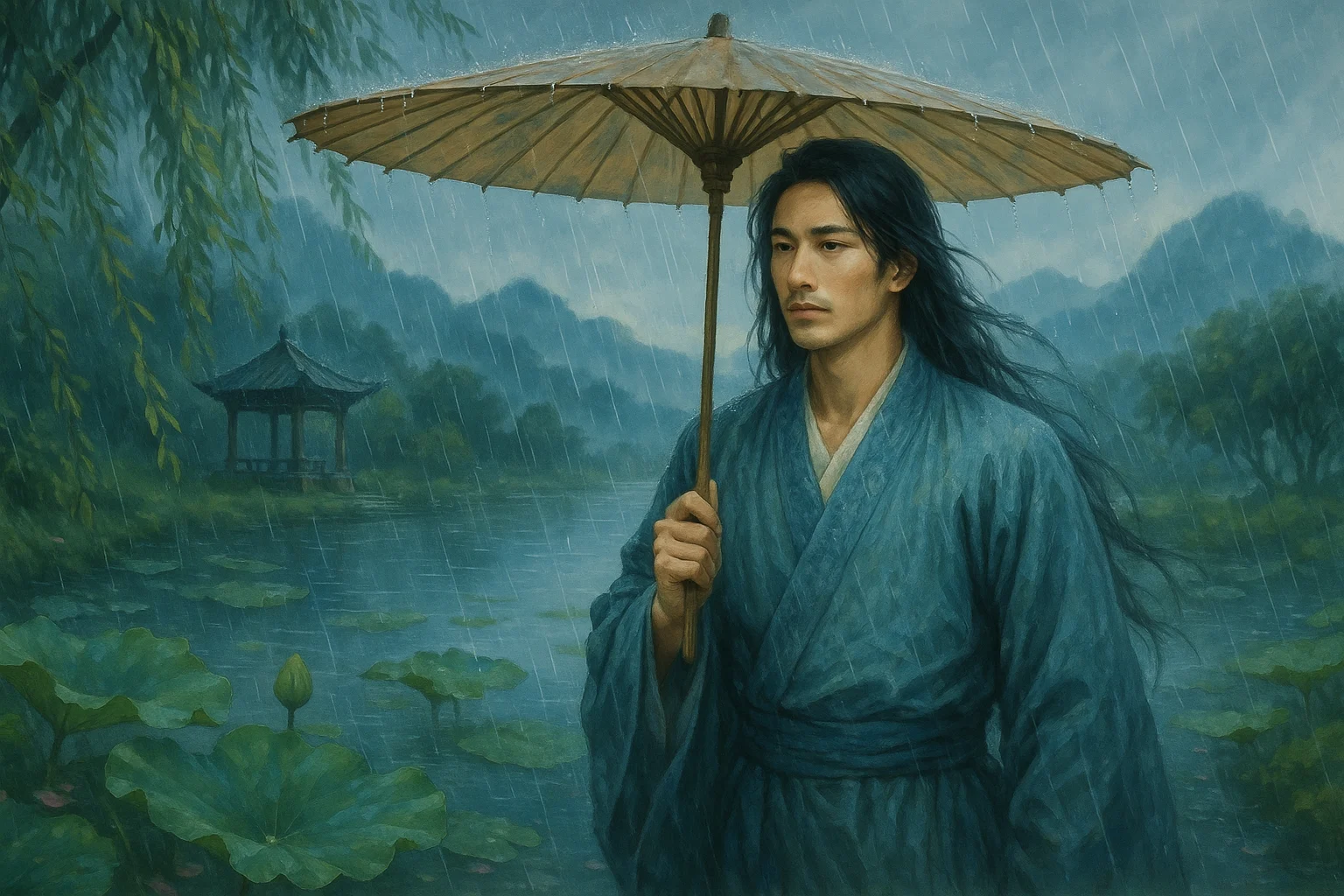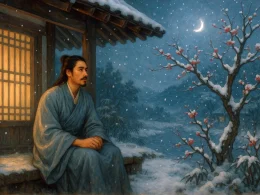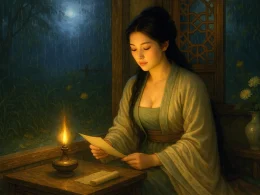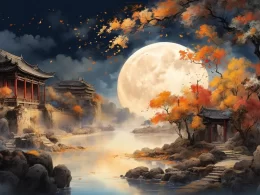The courtyard holds spring’s breath, not yet gone far,
Where peonies bloomed faintly under last night’s star.
My lord, draw up the screen with tender care—
The wind now turns, green shades veil rails in twilight’s glare.
I recall how short youth’s radiant nights would flow,
When Luoyang’s blooms companioned long ago.
One Yao Huang* graced my hair—a golden hue,
But feelings hid... Now sick and old, who tends to you?
Original Poem
「渔家傲 · 小院悠悠春未远」
小院悠悠春未远。牡丹昨夜开犹浅。
珍重使君帘尽卷。风欲转。绿阴掩映栏干晚。记得旧时清夜短。洛阳芳讯时相伴。
吕本中
一朵姚黄?髻满。情未展。新来衰病无人管。
Interpretation
This lyric was composed during the Southern Song Dynasty, though its exact date remains uncertain. Judging by its tone, it was likely written in Lü Benzhong's later years or during his travels. At this time, the Southern Song court was unstable, the poet's official career fraught with setbacks, his aging body plagued by illness. The poem combines delicate depictions of spring scenery and peonies with nostalgic recollections of moonlit nights and Luoyang's floral messages, while also conveying present loneliness and physical suffering. The stark line "Ailing and aged, with none to care" lays bare the isolation of twilight years, blending self-compassion with resignation—both a personal testament and a reflection of scholars' helplessness in turbulent times.
First Stanza: "小院悠悠春未远。牡丹昨夜开犹浅。珍重使君帘尽卷。风欲转。绿阴掩映栏干晚。"
Xiǎo yuàn yōuyōu chūn wèi yuǎn. Mǔdān zuóyè kāi yóu qiǎn. Zhēnzhòng shǐjūn lián jǐn juǎn. Fēng yù zhuǎn. Lǜ yīn yǎnyìng lángān wǎn.
Spring lingers in this quiet courtyard;
Last night's peonies bloomed pale, half-shy.
The noble Lord, with care, has raised all blinds—
While shifting winds prepare
To weave green shade through twilight's lattice bars.
The stanza opens with courtyard springscapes. The peonies' "pale bloom" suggests beauty restrained, a metaphor for spring's reluctant departure. "Raised blinds" imply an active embrace of nature, yet "shifting winds" and "twilight bars" quietly acknowledge time's inexorable flow, creating a serene yet wistful atmosphere.
Second Stanza: "记得旧时清夜短。洛阳芳讯时相伴。一朵姚黄?髻满。情未展。新来衰病无人管。"
Jìde jiùshí qīng yè duǎn. Luòyáng fāngxùn shí xiāngbàn. Yì duǒ Yáo Huáng? Jì mǎn. Qíng wèi zhǎn. Xīnlái shuāibìng wú rén guǎn.
I remember those clear nights, too brief—
When Luoyang's floral news kept me company.
A single 'Yao Huang' peony adorned my hair,
Yet feelings stayed unspoken…
Now, ailing and aged, with none to care.
Here memory takes over: Luoyang and its famed "Yao Huang" peonies symbolize lost splendor and unfulfilled romance. "Feelings stayed unspoken" hints at emotional interruption, while the abrupt finale "ailing and aged, with none to care" delivers a raw, unguarded cry of present solitude.
Core Structure: The first stanza paints spring's lingering beauty with subtle melancholy; the second contrasts past vibrancy with present decline. Emotion deepens progressively—from lamenting spring to mourning human connections, then to self-pity—forming a seamless lyrical arc.
Holistic Appreciation
Using springscapes and peonies as conduits, the poem bridges present observations and nostalgic reveries. The first stanza's "lingering spring" and "pale blooms" veil a reluctance to let go; "raised blinds" suggest engagement with nature, yet "twilight" whispers of inevitable decline.
The second stanza's Luoyang memories—where peonies symbolized prosperity and affection—become emotional anchors. But "feelings stayed unspoken" reveals unresolved yearnings, and the closing line's stark despair shatters the lyrical veil, leaving a resonant ache.
Blending subtlety with candor, the lyric merges the restrained elegance of wǎnyuē (婉约) style with Lü Benzhong's characteristic gravity. Though aligned with the Jiangxi School's ethos, his poetry here transcends rigid categorization, achieving a unique aesthetic poise.
Artistic Merits
- Scene-Emotion Alchemy
Spring imagery isn't mere description but a vessel for lamenting time's passage, threading memory and reality. - Symbolism & Stripped-Bare Confession
Peonies epitomize bygone glory, while the final line's raw outcry ("none to care") lays emotions bare. - Fluid Temporality
Shifts from present courtyard to remembered Luoyang, then back to sickbed isolation, occur with organic ease. - Precision with Depth
Compact yet potent, each image (peonies, blinds, twilight) builds layered emotional architecture.
Insights
The lyric reminds us that beauty and human connections are fleeting. Cherish shared moments before they become "feelings stayed unspoken." While nature offers solace against aging and solitude, its comfort has limits—underscored by the poem's unflinching close. This duality—clear-eyed about life's decline yet tender toward its transient joys—epitomizes classical literati wisdom.
About the Poet

Lü Benzhong (吕本中 1084 - 1145), a native of Shouxian in Anhui, was a renowned poet and Neo-Confucian scholar of the Southern Song Dynasty. As a key theorist of the Jiangxi Poetry School, he proposed the concept of "living method" (huofa), advocating for natural variation within established poetic rules. With over 1,270 surviving poems, his Genealogy of the Jiangxi Poetry School (Jiangxi Shishe Zongpai Tu) established Huang Tingjian as the school's patriarch, profoundly influencing Song poetic theory and serving as a bridge between the Jiangxi School and the Four Masters of the Mid-Song Revival.












